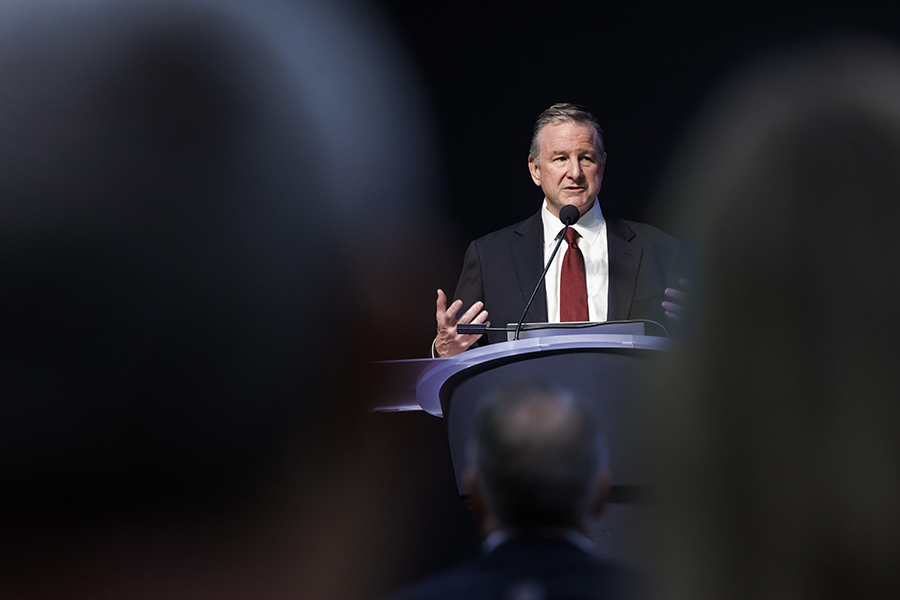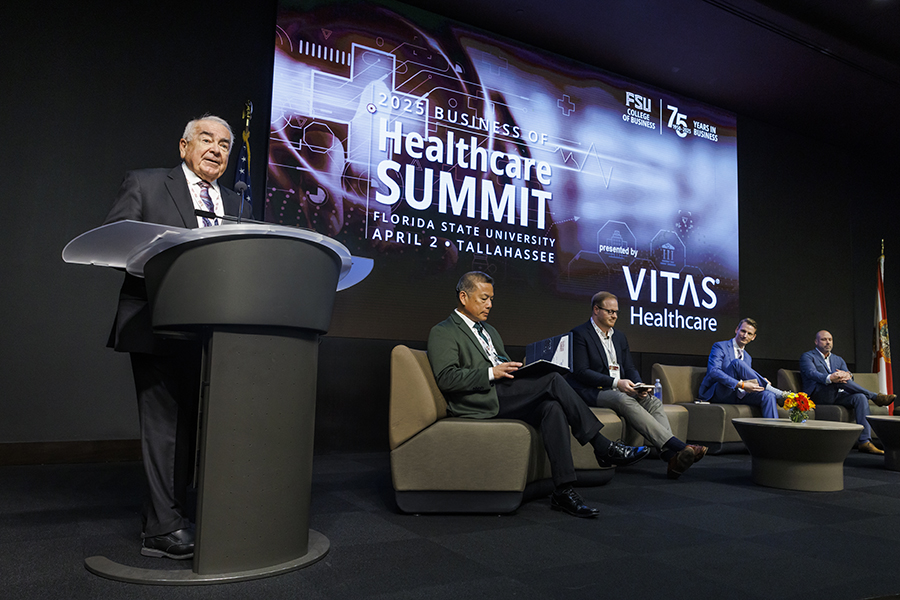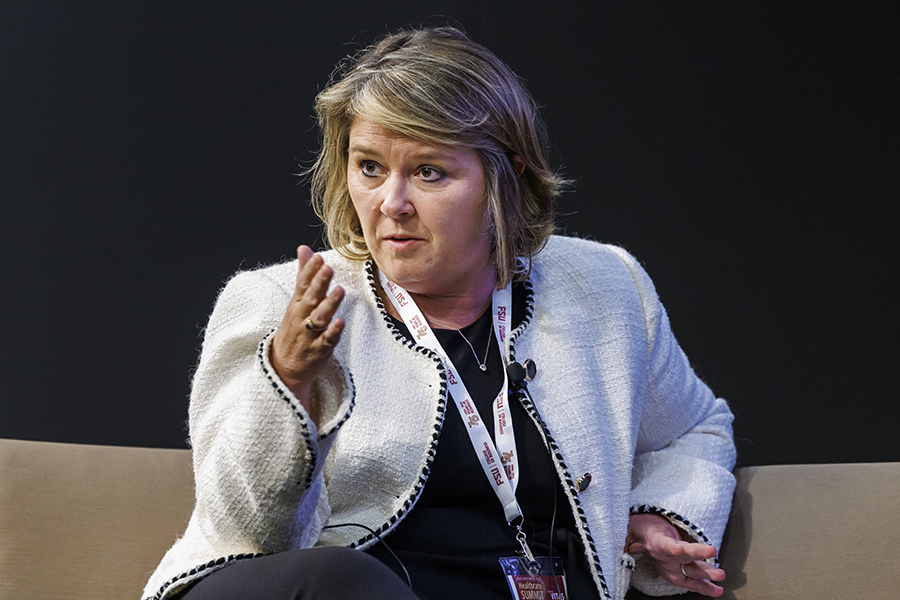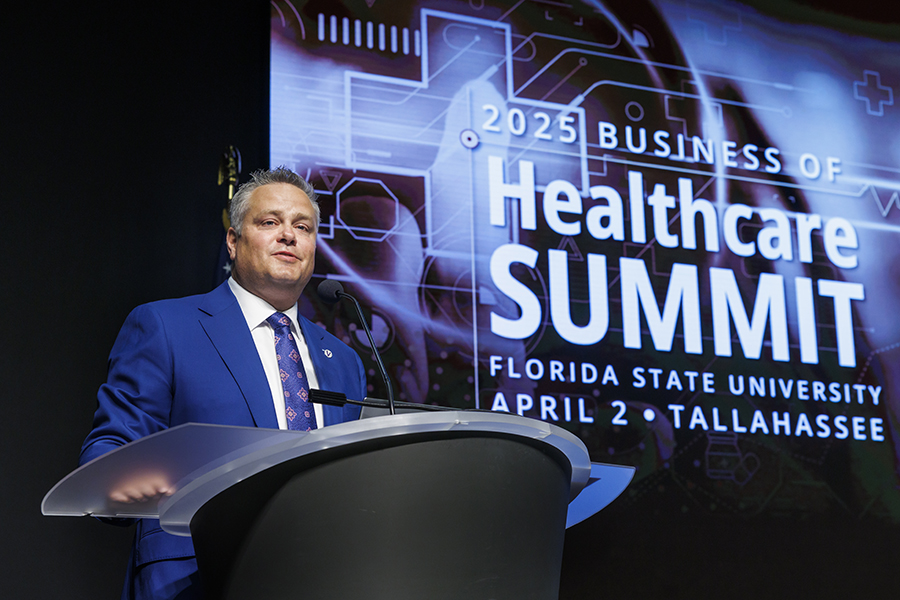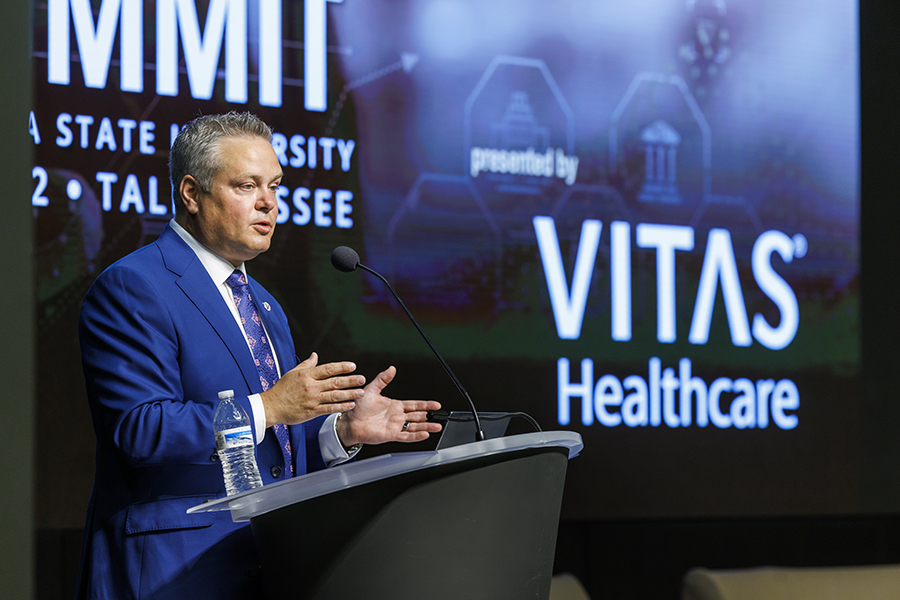
Health care executive Nick Westfall challenged industry leaders to embrace continuous evolution rather than seek one-time solutions to the state's and country's health care challenges.
"While the system is broken, there's always this theme, 'Let's go about and fix it,'" he said. "I don't like that comment, because fixing it implies that there's an end to it. It's going to constantly evolve, and the needs of our communities constantly evolve. We need to embrace that."
Westfall, chairman and CEO of Miami-based VITAS Healthcare, delivered the keynote address during the 2025 Business of Healthcare Summit last week at Florida State University. VITAS Healthcare, the nation's largest independent hospice and palliative care provider, served as the presenting sponsor of the second annual event, an enterprise of the FSU College of Business and an extension of the university's FSU Health initiative.
The summit filled the Augustus B. Turnbull III Florida State Conference Center with about 260 attendees, mirroring the sellout at last year's inaugural event. Attendees included health care executives, government officials, nonprofit leaders, university officials, faculty members and MBA and undergraduate student volunteers who served as FSU ambassadors.
Four panels of experts answered questions and discussed urgent topics such as costs, accessibility, financing, automation, artificial intelligence, cybersecurity, provider shortages and quality of care.
'It takes partnerships'
"Health care is personal," FSU President Richard McCullough told attendees. "It touches every one of us, our families, our lives, our communities and we take this responsibility incredibly seriously."
McCullough emphasized the university's and FSU Health's commitment to improving regional health care through academic health initiatives. Plans include construction of an acute-care hospital in Panama City Beach, announced last month, and an emerging academic health center on the Tallahassee Memorial HealthCare campus, set to open in 2026.
"Nothing happens in a vacuum - it takes partnerships," McCullough said. "It takes people to come together for a shared purpose. That's the reason for this summit, which looks at the operational as well as clinical side of health care."
Summit emcee Michael Hartline, dean of the FSU College of Business, said the event seized the opportunity to bring together top national, state and local experts "to discuss and to move toward solutions for the most pressing issues facing the health care industry."
Westfall, the keynote speaker, emphasized the importance of eliminating silos among health care stakeholders.
"I encourage you to let our guards down and talk about what we can do together," he said. "We all got in this to serve others."
Westfall highlighted demographics that underscore the need for innovation in Florida.
"Some 22% of the state's residents are older than 65," he said. Meanwhile, seniors continue to pour into the state, creating urgency for solutions as Florida's health care system increasingly adapts to serve an aging population with complex needs. Studies show that 80% of people over age 65 have at least one chronic condition, and 68% have two or more.
Westfall urged attendees to "think about how we can better challenge our status quo, disrupt what we're doing and not focus on the negative. Things can be improved."
He added: "I'm also here to tell you there is plenty of money and appetite in addition to federal and state government funding that wants to be deployed to support every aspect of health care."
'Focus on good operators'
Panelist Erin James Coward, Atlanta-based managing director and head of South and Southeast Healthcare Services Banking at JPMorgan Chase, discussed a shift in health care investment strategies.
Noting cases in which investors have lost money betting on overvalued companies, Coward said she sees in the years ahead increased investor emphasis on strong management and profits.
"You really have to understand your unit economics," she told attendees. "You really have to understand how your revenue model is going to work. It's no longer growth at all costs. I think a return to focus on good operators is where we're headed."
Industry leaders distinguished between health care integration and consolidation, noting that the latter doesn't necessarily lead to better outcomes.
"If you take that through the patient lens, which we should always do, the answer is this seamless flow of care and information within an ecosystem," said panelist Jim Boyman, vice president of GuideWell Health. "If we're really successful in integration, you're answering in the affirmative to the question, 'Do patients feel more connected and cared for?'"
Panelist Mary Mayhew, president and CEO of the Florida Hospital Association, suggested that everyone likely wants health care that is personal, local, efficient and affordable - "and, I'm going to add modern, sophisticated and world-class."
She then offered hope for the future of health care in Florida and the U.S.
'Hope for what is possible'
During the "unprecedented crisis" of the COVID-19 pandemic, Mayhew said, "I saw levels of ingenuity, creativity, innovation, collaboration and partnerships … that should give all of us a great deal of hope for what is possible."
Jennifer Crews, nurse administrator for practice and digital transformation at Mayo Clinic in Jacksonville, Fla., also expressed concern and optimism.
As a member of the panel "AI, Cybersecurity and Disruptive Technologies Transforming Healthcare," Crews said she has seen cases where nurses rely on automated tasks integrated into the electronic health record, or EHR, systems.
Meanwhile, Crews highlighted a pilot program - an AI-based ambient listening tool - that the Mayo Clinic will incorporate for nurses in inpatient settings.
She said nurses are telling her that "the act of being very thoughtful and verbally walking through their physical assessment with their patient is helping to elevate their clinical skills."
During his keynote speech, Westfall urged attendees to "maximize every minute of today" and to "walk out of here with one or two more nuggets of thinking differently about how we can disrupt the overall health care system."
And to students at the event, he said: "I hope you walk away with a job. And I hope you walk away inspired by how to move things forward, because it's going to take an army."

